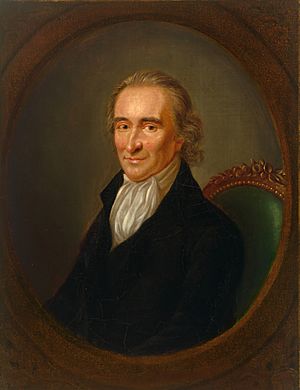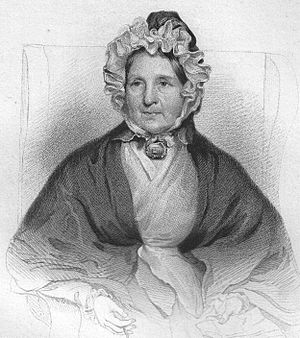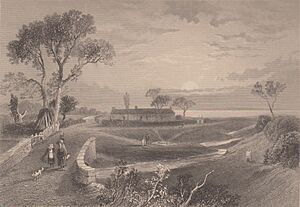William Maxwell (doctor) facts for kids
{{Infobox person | name = William Maxwell | image = File:Dr William Maxwell.jpg | caption = Dr William Maxwell | birth_date = 1760 His father, James Maxwell, took part in the 1745 uprising, and his grandfather, William, had fought in the 1715 uprising. Maxwell never married, but fathered a natural daughter, Elizabeth, who lived with him in Edinburgh. William Maxwell was a Scottish doctor and a close friend of the famous poet Robert Burns. Born in 1760, he came from a family with a history of supporting the Jacobite uprisings, which were attempts to restore the Stuart kings to the British throne. His father and grandfather had both been involved in these events.
Maxwell studied medicine and traveled widely, becoming interested in new ideas sweeping through Europe, especially those of the Age of Enlightenment. He even found himself in France during the exciting early days of the French Revolution. Later in life, he became a respected doctor in Scotland.
Contents
Early Life and Education
William Maxwell was the second son of James Maxwell. His family had lived in the area of New Abbey since the 1400s. William's father had to leave the country after being involved in the 1745 Jacobite uprising. The family's land was returned to them in 1753.
Sadly, William's father died when William was only two years old. In 1771, William and his two brothers went to school at a Jesuit College in Dinant, Flanders. This was a common choice for children from Jacobite families. When that school closed in 1773, the brothers moved to another academy in Liege.
After finishing his studies, William spent eight years at his family's home, the Kirkconnell Estate. He then decided to study medicine at Edinburgh University in 1784, becoming a doctor three years later.
Adventures in Revolutionary France
While studying in Edinburgh, William became very interested in the new ideas of the Age of Enlightenment. This was a time when people started to think more about reason, freedom, and human rights.
Maxwell tried to start a medical practice in Scotland and London. However, he decided to go on a "Grand Tour" of Europe instead. This was a traditional trip for young, wealthy men to learn about European culture. While on his tour, he found himself in Paris just as the French Revolution was beginning. He became friends with some of the revolution's leaders.
In 1789, Maxwell returned to London to calm his family's worries. But when he inherited some money, he went back to France. He was very excited by the revolutionary ideas. He even helped the revolutionaries by trying to buy weapons for them from England.
His support for the revolution became well-known. A newspaper even called him Britain's most wanted supporter of the French revolutionaries. Maxwell joined the National Guard in France. He was even among the special guards who escorted King Louis XVI on his way to be executed. It is said that Maxwell was so close that he dipped his handkerchief in the king's blood.
Return to Scotland and Medical Career
In February 1793, France declared war on Great Britain. William Maxwell decided to support his home country and returned to Britain. He was questioned at Dover but was allowed to enter.
His experiences in France made him realize that his early, very hopeful ideas about revolution were perhaps too simple. He spent some time with family before starting his medical career again in 1794. He had some success as a doctor in Dumfries. His family had to get used to the fact that he was quite famous because of his adventures.
Later, he moved to Edinburgh. He had a daughter named Elizabeth, who lived with him. William Maxwell died in 1834. He is believed to be buried with his father at Sweetheart Abbey.
Friendship with Robert Burns
William Maxwell met the famous poet Robert Burns in Dumfries. Because of Maxwell's past support for the French Revolution, the authorities in Scotland were suspicious of him. However, his skills as a doctor helped him gain the trust of ordinary people, though less so with the wealthy.
Like Burns, Maxwell was criticized in print by a group called the 'Loyal Natives'. This group held very strong opinions against revolutionary ideas. They wrote a poem that included Maxwell's name, along with Burns and others, in a negative way.
Burns responded with his own poem, defending himself and his friends:
|
Maxwell and Burns were very close friends. Burns wrote to his friend Frances Dunlop about Maxwell, saying that Maxwell was his "most intimate friend" and one of the "finest characters" he had ever met. Burns also mentioned that Maxwell was the "Dr Maxwell whom (Edmund) Burke mentioned in the House of Commons about the affair of the daggers."
Mrs. Dunlop was worried about Burns's friendship with Maxwell, especially because of Maxwell's connection to the French Revolution. However, a politician named Edmund Burke, who had criticized Maxwell earlier, later met him and said that Maxwell was not as dangerous as his reputation suggested.
Maxwell gave Burns a special dagger (a type of knife) that had once belonged to a Scottish lord. Burns later gave this dagger to a gunsmith. Interestingly, the gunsmith had previously given Burns a pair of pistols, which Burns later gave to Maxwell.
Burns's Illness and Death
Dr. Maxwell became Robert Burns's family doctor in 1794. He cared for Burns during his final illness. Maxwell diagnosed Burns with what was likely a heart infection or a severe form of rheumatism. He suggested sea-bathing and horse riding as treatments. These treatments were not effective and may have even made Burns's condition worse.
In July 1796, Burns traveled to a small village called Brow. He spent almost three weeks drinking from a special mineral well and bathing in the waters of the Solway Firth. When he returned to Dumfries, his friend John Syme visited him and was shocked by how ill he looked. Syme wrote to another friend, saying that "Dr Maxwell told me yesterday he had no hopes."
Just before Burns died, he gave Dr. Maxwell his pair of pistols. These pistols are now kept in the Royal Museum of Scotland. It is said that Burns told Maxwell, "Alas! What has brought you here? I am but a poor crow, and not worth plucking." Another version of his words was, "What business has a physician to waste his time on me? I am a poor pigeon not worth plucking. Alas! I have not feathers enough upon me to carry me to my grave."
Burns's wife, Jean Armour, named their last son Maxwell Burns in honor of the doctor, who had actually delivered the baby. Jean did not know that Burns had planned to name the baby Alexander Cunningham Burns, after another good friend.
After Robert Burns passed away, William Maxwell and John Syme organized his funeral. Along with Alexander Cunningham, they became trustees. They worked to collect money to make sure that Burns's wife and children would be financially supported. They had even started planning this fundraising effort two days before Burns died.
|
 | Victor J. Glover |
 | Yvonne Cagle |
 | Jeanette Epps |
 | Bernard A. Harris Jr. |




